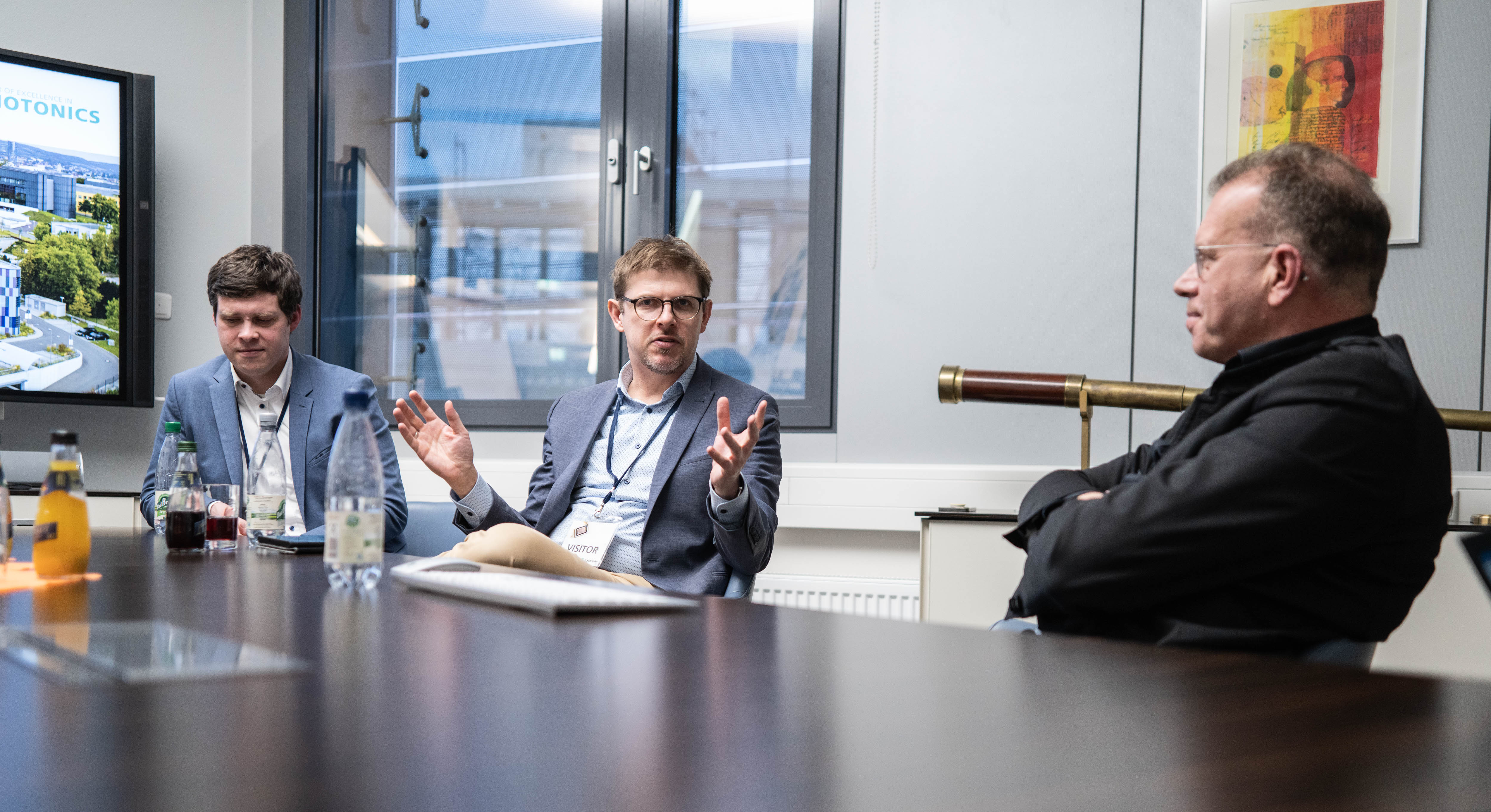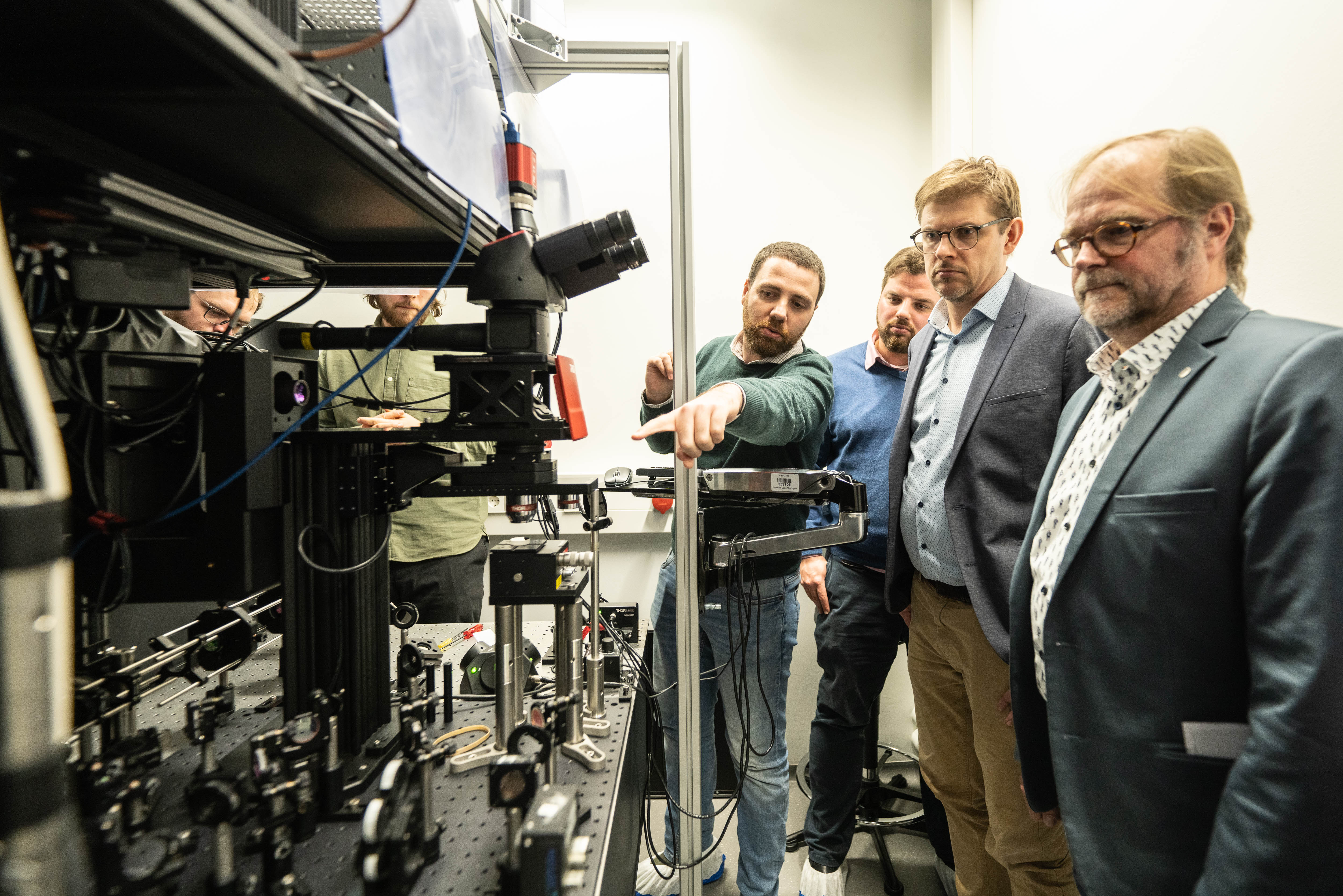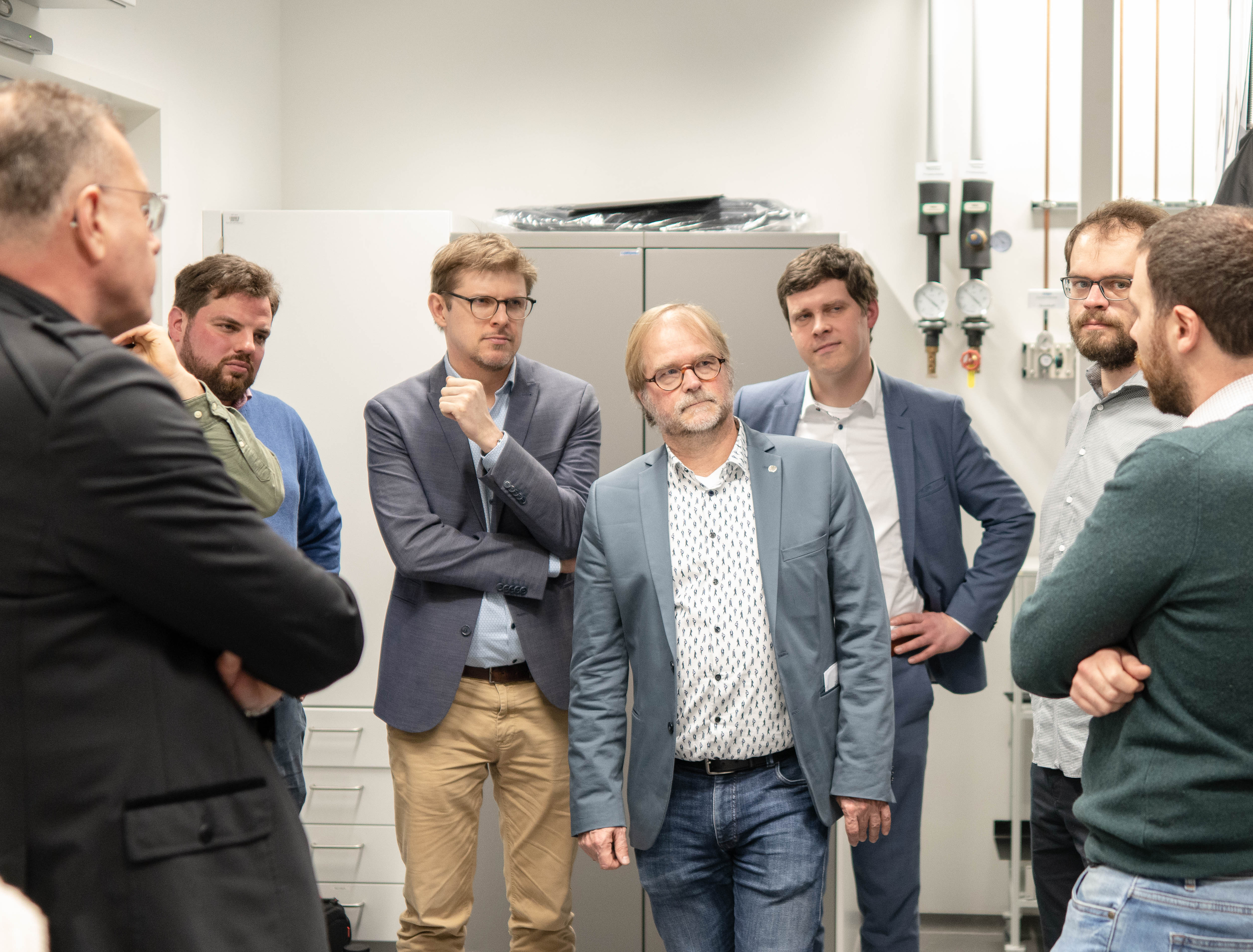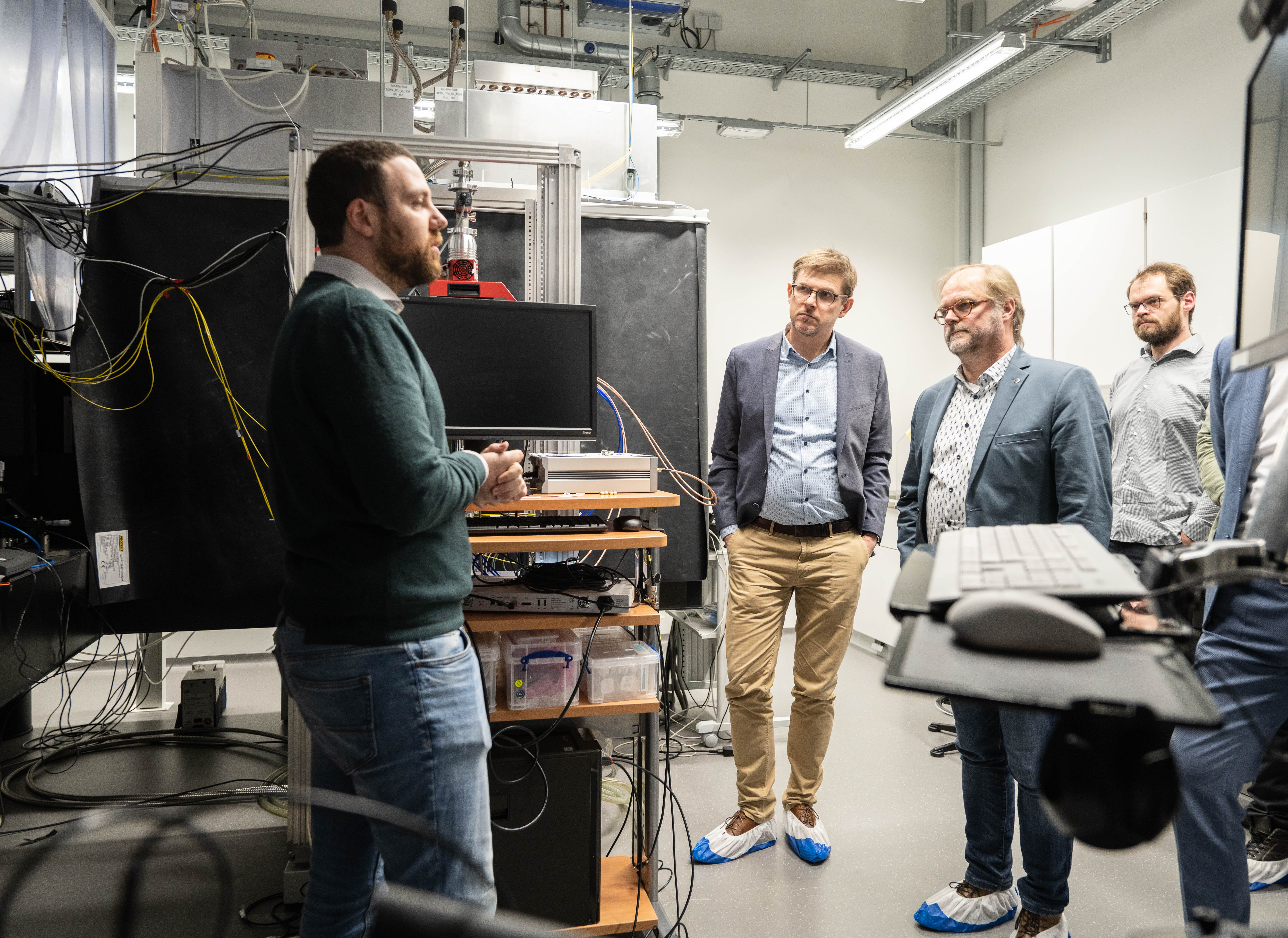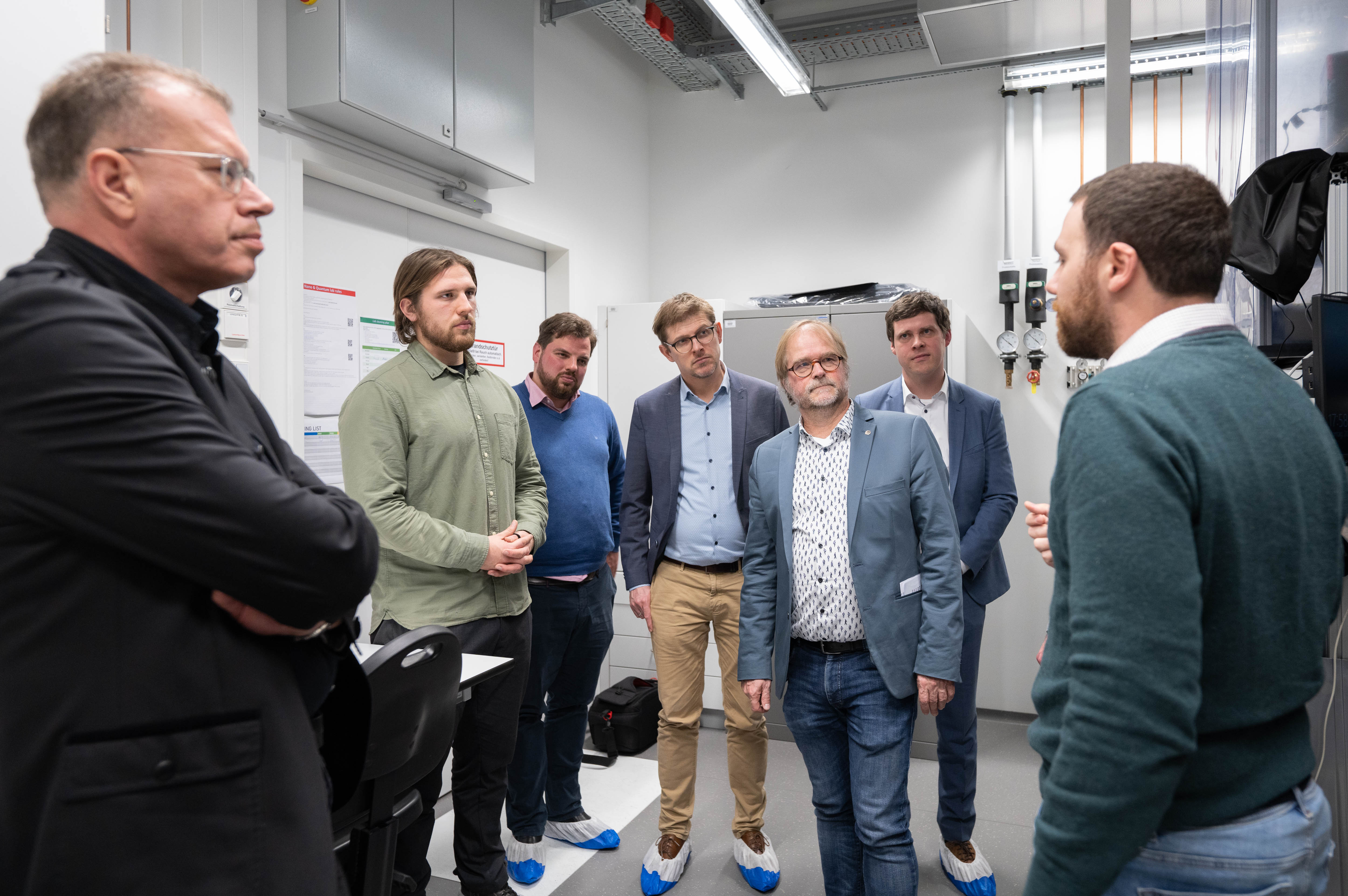Jena, Germany / 23 February, 2023
"IT Security is a European Task"
Members of Parliament from Europe, the Federal Government, and the State inform themselves at Fraunhofer IOF about quantum research as an opportunity for a sovereign Europe
What is the significance of quantum communication for Europe's technological sovereignty and long-term data security? A delegation of members of Parliament from Europe, the Federal Government, and the State recently talked about this with institute director Prof. Dr. Andreas Tünnermann during a visit to the Fraunhofer Institute for Applied Optics and Precision Engineering IOF. He called for more political will and a more active industrial policy on the part of Europe.
"IT security is close to my heart," says Andreas Tünnermann, underlining a topic of immense importance: the long-term security of European data. Because this is currently facing major challenges against the backdrop of the latest technological advances. More powerful computers and new algorithms are already threatening our IT security. Data can already be stored today and one day read out, for example, with the help of quantum computers and their enormous computing power.
New encryption technologies are therefore needed to protect European trade secrets, for example, as well as the sensitive data of EU citizens. High-security communication with light particles, known as quantum communication, offers a physically demonstrably secure option that will allow us to communicate in a practically tap-proof manner in the future.
A holistic European task
Andreas Tünnermann, director of Fraunhofer IOF, exchanged views on the forward-looking significance of quantum communication with Matthias Ecke, member of the European Parliament, as well as Lutz Liebscher, member of the State Parliament, and Dr. Holger Becker, member of the German Bundestag, (all SPD) during their visit to Fraunhofer IOF on February 20, 2023.
During the discussion, Andreas Tünnermann drew special attention to the need for an active industrial policy on the part of the European Union: It is of little use if methods for highly secure encryption are researched in Europe, but parts and components for computers and smartphones still have to be purchased outside Europe. "You can encrypt as effectively as you like, but even the most highly secure cryptography will be compromised if there is an easy-to-open backdoor in every piece of computer hardware," he stated.
The institute's director sees decision-makers at the European level as having a particular responsibility: "IT security is a European task," he explained in a dialog specifically with Matthias Ecke. He suggested that the EU Commission's data security department be massively expanded. Furthermore, he emphasized that "assessment competence and political will" are required for this holistic European task.
The delegates were impressed by the research and development work being driven forward in Jena in various quantum-related research projects. Among them, first and foremost, the QuNET initiative, funded by the German Federal Ministry of Research and Education with 125 million euros, which has already successfully demonstrated the secure exchange of sensitive data. Together, they additionally toured a quantum laboratory at the Abbe Center of Photonics.
Jena researchers achieve record values in quantum key exchange
Quantum encryption makes use of the special properties of quantum particles, i.e., specially modified light particles. Of these, quantum entanglement, once described by Albert Einstein as "spooky action at a distance," is considered a key element for state-of-the-art communication systems. Light particles are expected to make our communications virtually tap-proof in the future. For this to succeed, systems must be created that enable the reliable exchange of so-called quantum keys over various distances. The Fraunhofer IOF has been researching various possibilities here for some time:
A local test track for the exchange of quantum keys via free beam, i.e., through the air, has already been in place between Fraunhofer IOF and the Jena municipal utilities since 2021. Here, quantum keys have already been successfully exchanged over a distance of 1.7 kilometers. The researchers from Jena achieved key generation rates in the range of several kilobits per second. This generation rate is one of the highest in the world for the exchange of a quantum key over free space within an urban area. It would be sufficient to encrypt a telephone call within a city in a highly secure manner without any problems.
Even greater distances can be achieved via fibers. In September 2022, quantum keys were exchanged for the first time via optical fiber over a distance of 75 kilometers between Jena and Erfurt. In order to be able to encrypt even a European communication network in a quantum-secure manner, the exchange of quantum keys via satellites is also being pursued. Current research projects such as HyperSpace and QuDICE, which are being co-designed at Fraunhofer IOF, aim to create a basis for this.
Verifiably physically secure encryption
The special feature of quantum communication is that, unlike conventional cryptography methods whose security is based on complex computing tasks, the security of quantum cryptography is based on physical principles. In an eavesdropping attack, the light particles used to generate the quantum key are measurably altered.
A cyberattack is thus clearly detected and the compromised quantum key is discarded, leaving the information protected. "We want to build the networks to make European communication physically secure," sums up Andreas Tünnermann about the goals of various quantum research projects at Fraunhofer IOF and their importance for Europe's technological sovereignty.
